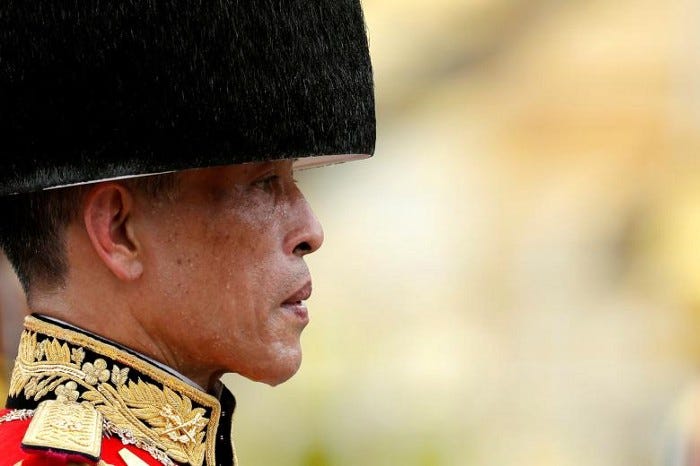Beware the black ribbon
Inside King Vajiralongkorn’s dreaded military punishment camp
Drama at the funeral
Under a merciless sun, hundreds of soldiers and palace servants stood stiffly to attention, waiting for King Rama X of Thailand, Vajiralongkorn Bodindradebayavarangkun, to emerge for another ritual in the five-day funeral ceremony for his father.
It was the climactic day of the funeral rites — October 26, 2017 — when a gilded royal urn symbolising the remains of King Rama IX, Bhumibol Adulyadej, would be slowly pulled through the streets of Bangkok’s royal district on an ornate chariot to the vast crematorium complex where his body would be burned on a soaring pyre.
The funeral ceremonies were particularly punishing for soldiers in the Royal Guard, whose ceremonial uniform includes red jackets buttoned tightly right up to the neck, and towering furry hats modelled on the bearskin helmets used by some European armies centuries ago. This uniform is totally impractical for the tropical heat of Thailand, but in the 19th century King Rama V, Chulalongkorn, sought to protect his monarchy against encroaching colonial powers by copying some of the uniforms, ceremonies and customs of Western royal houses.
Vajiralongkorn himself wore the full uniform during some of the funeral ceremonies, and was photographed dripping with sweat.
The funeral was broadcast on every Thai television channel. Hundreds of thousands came to Bangkok to witness the rituals, and millions more tuned in around the country to watch. Everything had been painstakingly planned and choreographed, and three full dress rehearsals had been held. The palace wanted everything to be perfect.
But one Royal Guard officer was overcome by the heat. Thais watching the live broadcast saw him suddenly topple to the ground. Officials raced to help him, and lifted him back on his feet. He continued to sway, apparently still lightheaded, but managed to recover and continue with the ceremony.
Watching what was happening, the royals could be seen reacting with alarm when the officer collapsed.
It’s not uncommon for troops to faint in such circumstances — in Britain, for example, five soldiers in the Queen’s Guard fainted at the Trooping the Colour ceremony at Buckingham Palace in June 2017. Officials blamed unusually warm weather, but even in a heatwave London is much cooler and less humid than baking Bangkok.
Vajiralongkorn, however, demands perfection from Thai soldiers. He has a fetishistic obsession with ensuring their uniforms are exactly right, that they follow drills and ceremonies without a single error, and that they are in peak physical condition.
Thai soldiers have learned to dread ever coming to Vajiralongkorn’s attention due to even small mistakes. They know they face punishment at a military boot camp at the king’s Thaweewattana Palace west of Bangkok.
Vajiralongkorn personally decides the length of punishment, based on a system of “black ribbons”, or “โบว์ดำ” in Thai:
One black ribbon: one month.
Two black ribbons: three months.
Three black ribbons: nine months.
The man who fainted at the funeral was Commander Kritanai Pantabutr, a naval officer in the Royal Aide-De-Camp Department. He was given three black ribbons by a furious Vajiralongkorn, military sources say. He spent nine months in the king’s punishment camp, and was also demoted to become an ordinary soldier in Vajiralongkorn’s personal Royal Guard 904 military force.



